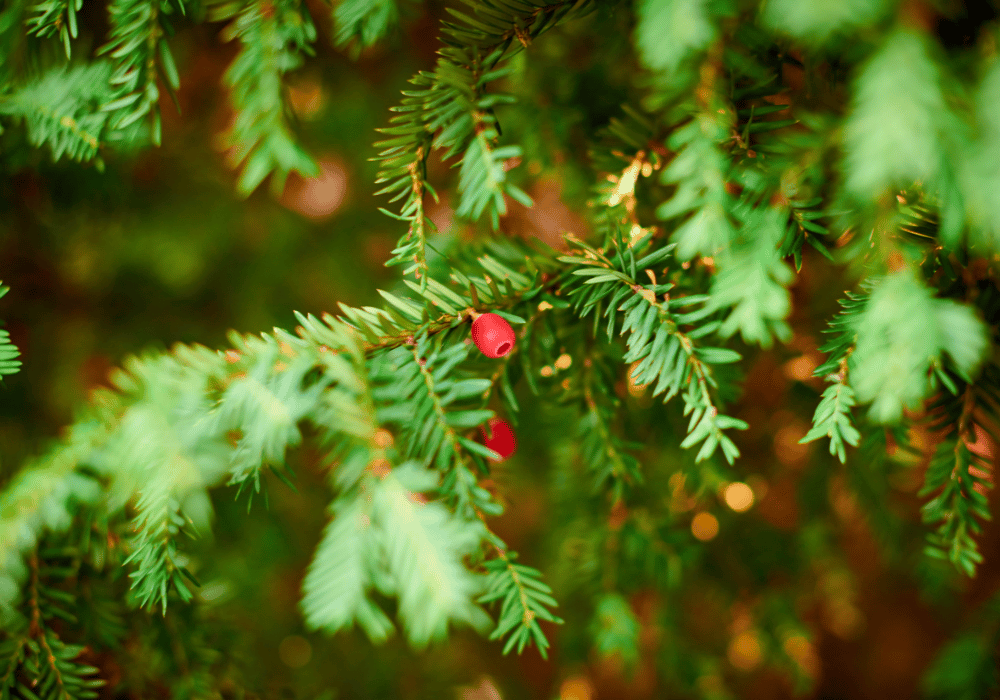Every horse owner should know that the yew tree is poisonous, but few know just how toxic it truly is. A horse consuming any part of the yew plant is a veterinary emergency and the prognosis is extremely poor. That is why it is vital that owners understand how to identify a yew plant and the signs that your horse may have ingested this extremely poisonous plant. This guide covers how to identify a yew tree, the symptoms of yew poisoning, and how to prevent yew poisoning.
Identifying the Yew Tree
Being able to identify yew trees is key to preventing your horse from accessing and ingesting the plant. Yew trees are some of the few native evergreen trees in the UK. While they are often very large in their natural state, they can be cultivated and shaped in decorative gardens.
Common yew trees will have needles on either side of new green shoots, red berry-like cones and purple bark. Historically, yew trees have been planted around cemeteries and large houses. One reason for this is that they were planted to prevent people from grazing livestock there.
All parts of the yew tree are highly toxic. They contain toxic alkaloids (A and B). These toxins are very fast-acting, causing cardiotoxicity and sudden death. For a 500kg adult horse, the toxic dose of Yew is estimated to be 100-200g (about a mouthful or two). After ingestion of this dose, death will occur usually within 2-3 hours, but often much quicker.
The Signs of Yew Poisoning in Horses
Yew poisoning in horses is particularly dangerous due to the rapid onset of symptoms and the potency of toxins. Even small amounts of yew can have devastating effects on our equines. For this reason, it’s essential that you are vigilant and ensure your horses are not allowed to graze anywhere near a yew tree, or in an area where clippings from the tree may have been deposited.
Symptoms of yew poisoning in horses include:
- Nervous signs such as muscular trembling and a lack of coordination
- A rapid and irregular heartbeat
- Difficulty breathing
- Abdominal pain (colic)
- Diarrhoea
- Sudden collapse or death
If you suspect yew poisoning, you should contact your equine vet practice immediately. Every second counts when it comes to yew poisoning and immediate veterinary attention is required. Quick intervention can be the difference between life and death.
What is the Treatment of Yew Poisoning in Horses?
Unfortunately, there is no treatment for yew toxicity, so it is extremely important to ensure that horses are not grazed near yew trees. Yew poisoning is one of those cases where prevention is absolutely essential.
Supportive therapies can be successful depending on the amount of yew ingested and how quickly veterinary intervention is received.
The prognosis for yew poisoning is poor, so it’s essential that horses are not grazed near the tree, nor in any areas where clippings may have been left.
How to Prevent Yew Poisoning
The only guaranteed way to prevent yew poisoning is to ensure your horses never have access to the plant.
Identify any yew trees in your paddock and remove any from areas that are accessible to horses. While yew is bitter-tasting and generally avoided by horses, if they don’t have enough grazing or forage, they may still choose to eat it. Horses can also accidentally eat yew whilst grazing and even very small quantities can be fatal.
You should also properly dispose of yew clippings. Do not dispose of clippings in areas where horses may access them or where they may be blown into your horse’s paddock.
Take periodic walks around your paddock to check for the presence of potentially poisonous plants. You should also check hay and haylage bales to ensure there are no poisonous plants within them.
Avonvale Equine Vet Practice
We are an independent equine-only vet practice based in Ratley, near Banbury. Our experienced equine vets are happy to advise clients on all aspects of their horse’s health, diet and management, including how to manage toxic plants and prevent poisoning.
To register your horse with our equine vet practice, please call 01295 670 501 or you can register with us online.








